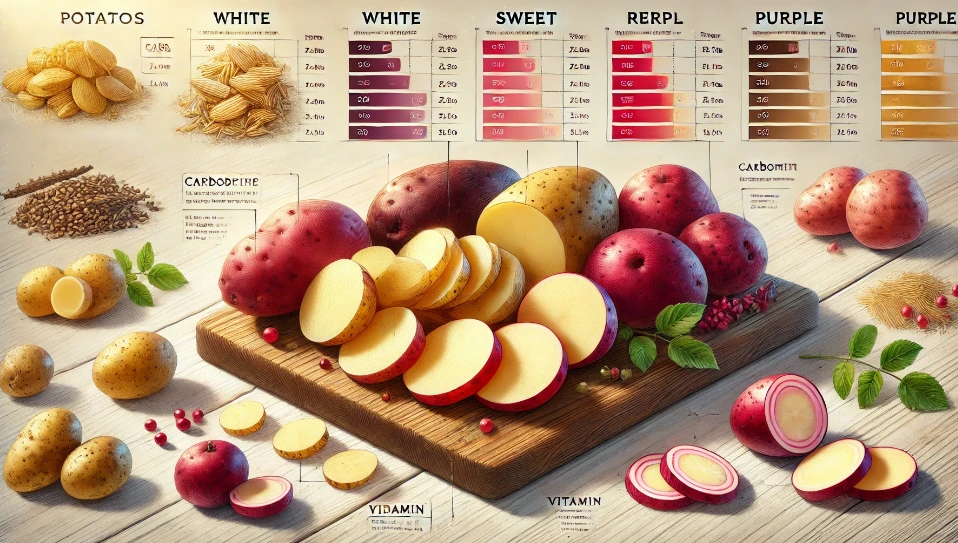Potatoes are a popular staple food around the world, and their nutritional profile often sparks debate, particularly concerning carbohydrates. Are potatoes high in carbs, and if so, does that mean they should be avoided? In this article, we will dive deep into the carbohydrate content of potatoes, discuss how they fit into a balanced diet, and explore their potential health benefits and drawbacks.
Understanding Carbohydrates in Potatoes
Carbohydrates are one of the three macronutrients that our bodies rely on for energy, alongside proteins and fats. Potatoes are classified as starchy vegetables, which means they are naturally rich in carbohydrates. But how much exactly?
Carbohydrate Content of Potatoes
The carbohydrate content of a potato depends on its size and how it’s prepared. Let’s break down the carb content of different types and preparations of potatoes:
| Type of Potato | Serving Size | Carbohydrate Content (grams) |
|---|---|---|
| Boiled, White Potato (with skin) | 1 medium (150g) | 30-35g |
| Baked Potato (with skin) | 1 medium (150g) | 35g |
| Mashed Potatoes (without added fat) | 1 cup (210g) | 33-36g |
| French Fries (fried) | 1 cup (117g) | 50g |
| Sweet Potato (baked) | 1 medium (130g) | 26-30g |
Health Benefits of Potatoes: Nutritional Powerhouse for Heart, Digestion, and Weight Management
As shown in the table, the carbohydrate content of potatoes can vary based on the type of potato and its preparation. White potatoes typically contain about 30-35 grams of carbohydrates per medium-sized serving. Fried potatoes, such as French fries, tend to have a higher carb content due to additional fat and starch created during frying.
Are Potatoes “Bad” Because They’re High in Carbs?
The answer is not that simple. Potatoes are high in carbohydrates, but carbohydrates are not inherently bad. In fact, they are essential for our body to function, providing energy to our muscles and brain. The key is understanding how to incorporate potatoes into a balanced diet.
The Role of Carbs in a Healthy Diet
Carbohydrates are the body’s preferred source of energy, particularly for brain function and physical activity. Potatoes, as a carbohydrate-rich food, provide a slow-release of energy due to their high fiber content (when eaten with the skin), making them more satiating than simple sugars or processed carbs.
- Complex Carbohydrates: Potatoes contain complex carbohydrates, which means they provide a steady source of energy, especially when combined with dietary fiber.
- Glycemic Index (GI): Potatoes have a moderate to high glycemic index, meaning they can cause a quicker rise in blood sugar levels. However, pairing them with fiber, protein, or healthy fats can help reduce this spike.
Types of Potatoes and Their Nutritional Benefits
Different types of potatoes have varied nutritional profiles. While all potatoes are rich in carbohydrates, some provide additional vitamins, minerals, and antioxidants.
White Potatoes
White potatoes are among the most commonly consumed, especially in boiled or baked forms. In addition to carbs, they are a good source of:
- Vitamin C: Boosts immune health and promotes healthy skin.
- Potassium: Supports heart health and balances blood pressure.
- Fiber: When consumed with the skin, they provide dietary fiber, promoting healthy digestion.
Sweet Potatoes
Sweet potatoes are often considered the more “nutritious” potato variety because of their high content of beta-carotene (a precursor to vitamin A) and antioxidants. Their carbohydrate content is slightly lower than white potatoes, but they offer other significant benefits:
- Vitamin A: Crucial for eye health and immune function.
- Lower Glycemic Index: Compared to white potatoes, sweet potatoes have a lower GI, making them better for managing blood sugar.
Red and Purple Potatoes
Red and purple potatoes contain higher levels of antioxidants, especially anthocyanins, which give them their distinctive color. These antioxidants are known for their anti-inflammatory and heart-healthy properties.
- Anthocyanins: These compounds can help reduce oxidative stress in the body and support heart health.
Are Potatoes Good for Weight Loss? Nutritional Benefits and Tips
Pros and Cons of Including Potatoes in Your Diet
Now that we understand the nutritional profile of potatoes, let’s examine the pros and cons of eating them regularly.
Pros of Eating Potatoes
- Rich in Nutrients
Potatoes are not just a source of carbs; they provide a variety of essential nutrients, including vitamin C, potassium, and fiber.
- Vitamin C supports immune health.
- Potassium regulates blood pressure and fluid balance.
- Fiber helps maintain a healthy digestive system.
- High in Fiber (when eaten with the skin)
The skin of potatoes is a good source of dietary fiber, which aids in digestion and can help lower cholesterol levels. - Low in Fat
Potatoes are naturally low in fat, making them a healthy choice when prepared without added fats or oils. - Versatile and Satiating
Potatoes are highly versatile, and their starchy nature makes them a filling, energy-boosting food. Eating potatoes can help you feel fuller for longer, which can prevent overeating.
Cons of Eating Potatoes
- High Glycemic Index
Potatoes can cause a significant rise in blood sugar, especially when consumed in refined or processed forms (such as fries or chips). This may not be suitable for individuals with diabetes or insulin resistance. - Potential for Weight Gain
While potatoes are low in fat, how they are prepared plays a key role in their health effects. Fried potatoes or those with added butter and cheese can lead to excess calorie intake, contributing to weight gain over time. - Nutrient Loss During Processing
Processing methods like frying or removing the skin can strip potatoes of important nutrients, particularly fiber and potassium. - Risk of Overconsumption
Due to their delicious nature (especially in fried forms like chips or fries), it can be easy to overconsume potatoes, leading to an imbalanced diet high in starchy carbs.
Pros and Cons Table
| Pros | Cons |
|---|---|
| Rich in nutrients (Vitamin C, Potassium) | High glycemic index – can raise blood sugar |
| High in fiber (with skin) | Can contribute to weight gain when fried |
| Naturally low in fat | Nutrient loss during processing |
| Versatile and filling | Risk of overconsumption in processed forms |
How Potatoes Fit Into Special Diets
Potatoes may be a concern for those following low-carbohydrate diets, such as the ketogenic diet, which restricts daily carb intake. However, they can still be a part of a healthy diet for many individuals. Let’s explore how potatoes fit into different dietary plans:
Low-Carb and Keto Diets
- Potatoes and Keto: Potatoes are generally not recommended on ketogenic diets because of their high carbohydrate content. Consuming just one medium potato could exceed the daily carbohydrate allowance for this diet.
- Alternatives: For those following low-carb diets, cauliflower or zucchini can be good alternatives to mashed potatoes or fries.
Balanced and Mediterranean Diets
- Moderation: In balanced diets like the Mediterranean diet, potatoes can be included in moderation. The focus is on pairing potatoes with other nutrient-rich foods, such as vegetables, olive oil, and lean proteins.
Diabetic Diets
- Managing Blood Sugar: People with diabetes need to be mindful of the glycemic load of potatoes. However, they don’t necessarily need to avoid them. Instead, they can pair potatoes with fiber-rich vegetables or protein to slow the absorption of sugars into the bloodstream.
Best Ways to Prepare Potatoes
While potatoes themselves are nutritious, how you prepare them greatly impacts their healthiness. Below are some of the best and worst ways to enjoy potatoes:
Healthier Cooking Methods:
- Boiled or Steamed: Keeps the nutrient content high and reduces added fats.
- Baked: Baked potatoes are filling and can be seasoned with herbs and spices for extra flavor without added calories.
- Roasted: Roasting with a small amount of olive oil provides a crunchy texture while keeping the calorie count in check.
Less Healthy Cooking Methods:
- Fried (French Fries or Chips): Frying significantly increases the calorie and fat content, especially when using trans fats.
- Mashed with Butter and Cream: While creamy mashed potatoes are delicious, they often contain high levels of saturated fats, making them less healthy.
Conclusion
Potatoes are undoubtedly high in carbohydrates, but they are also packed with nutrients that make them a valuable addition to many diets. The key is moderation and choosing the right cooking methods. While potatoes may not fit into very low-carb diets, they can certainly be part of a balanced, healthy eating plan when enjoyed in their natural, minimally processed forms.
Remember, like any other food, the healthiness of potatoes depends largely on how they are prepared and what they are served with. By focusing on whole, unprocessed potatoes and pairing them with fiber, lean proteins, and healthy fats, you can enjoy the benefits of this versatile vegetable without overloading on carbs.
In summary, potatoes are high in carbohydrates, but they are also nutrient-dense and versatile. The key to incorporating them into a healthy diet lies in portion control, preparation methods, and mindful pairing with other foods to balance blood sugar and calorie intake.

